
New non-invasive treatments for the control and treatment of early childhood caries
Aim
Description
Oral health is essential to general health and significantly influences the development of children. Dental caries has a high economic and social impact due both to the costs associated with its treatment as well as the societal cost of days lost in school by children, in the work by their parents and the sequels that remain throughout life. Every year the world’s economies lose more than 442 billion USD because of oral diseases. Preschool children with caries have higher hospitalisation costs, poorer school attendance, physical development, and their parents lose more work days.
Two out of three young people in Latvia currently have active caries lesions, which can no longer be prevented. There are generations of Latvians whose only experience of dentists has been the extraction or restoration of their teeth. This traditional operative treatment of carious lesions often fail. This is especially true when tooth restoration is performed at an early age, as usually results in premature tooth extraction.
Dentistry is moving from a surgical to a minimally invasive approach, as traditional treatments have shown to be ineffective, specially against early childhood caries (ECC). Less invasive caries treatment strategies have been proposed that would have the advantage of lowering the costs of care as well as decreasing the number of tooth extractions. These include fluoride varnishes and silver diamine fluoride (SDF) applications. Fluoride applications have been shown to be effective in decreasing the incidence of early childhood caries while SDF has been shown to be effective in arresting the progression of cavitated lesions. However, a usual adverse effect of SDF is that it stains the teeth black. New formulations have appeared that replace silver with copper (Tiefenfluorid), to avoid this. At this moment, the effectiveness of Tiefenfluorid to arrest carious lesions in permanent teeth is proven, but there are no studies in deciduous dentition, or clinical studies comparing the effectiveness of all those non-invasive treatments.
We aim to improve the oral health of pre-schoolers through a cost-effective, non-invasive and painless approach in order to increase the probability that Latvian children develop in a healthy manner and can realize their full potential. Based on acquired results new clinical guidelines with evidence-based treatment protocols will be introduced for the treatment of ECC and subsequent new pharmaceutical products could be developed.
Activities in the project
- Project result dissemination
In order to inform the public about the current issues of the project, information about the results of the research has been disseminated in various ways.
In the journal Zobārstniecības raksti, a popular scientific article titled “Noninvasive and minimally invasive caries treatment methods and their role in COVID-19 pandemic circumstances” ("Neinvazīvas un minimāli invazīvas kariesa ārstēšanas metodes un to loma COVID-19 pandēmijas apstākļos") was published in the printed version of the journal. https://lza-zobi.lv/lv/par-asociaciju/zurnals-zobarstniecibas-raksti/1-nr-2021
An article (in Latvian) about the treatment methods used in the clinical trial was published in Delfi.lv https://www.delfi.lv/campus/raksti/vai-speciala-laka-aizstas-piena-zobu-labosanu?id=52743333
Participation in the TV programme Pārtikas revidents, talking about caries problem in Latvia, reasons and solutions. https://replay.lsm.lv/lv/ieraksts/ltv/207904/partikas-revidents
Participation in the virtual event of the European Scientists' Night 2021 with a poster presentation. https://drive.google.com/file/d/1hdSkCrXfbs-32n0vk_c48Cc3PIWEv56h/view?usp=sharing
In relation to the topic of the study and the need for measures to reduce the spread of COVID infection in the dental sector, clinical guidelines have been prepared and submitted to the Latvian Dental Association. See the guidelines
Interview with Ilze Maldupa in the cycle 'Return to RSU'. The postdoctoral project has been one of the motivators for continuing a researcher's career in Latvia.
https://www.rsu.lv/en/news/returning-chile-rsu-assistant-professor-ilze-maldupas-experienceUpdated 30.04.2021.
- Achievements in the first half of the year
Due to the international situation created by COVID-19, the planned mobility activities to the University of Michigan in the USA and to the University of Dundee in the UK were cancelled, however, these visits were replaced by online webinars, where we improved the research protocol together with prof. Carlos Gonzalez-Cabezas and Margherita Fontana from the University of Michigan and with Nicola Innes from the University of Dundee and Cardiff University in the UK.
All the necessary research instruments for the clinical trial during the project have been prepared - an informative letter with an informed consent form, visual analogue scale (VAS) to assess patient satisfaction after treatment, form to register any emergency treatment performed in the time of the study, examination form to be used at the beginning of the study – includes questions about risk factors and clinical examination form; examination form to be used at the follow-up visit – includes Likert scale questions about parental acceptance of the performed treatment, questions about risk factors, VAS to evaluate patient satisfaction with the treatment performed and clinical examination forms.
Guidelines have been developed for all those involved in the study - reception staff, dentists and assistants from two different working groups. Several instruction sessions have been held - in clinical photography, reception staff instructive session, guidelines for dentists and assistants.
Information about the project has been promoted in various ways. Public activity event was organized - interview for the radio podcast "Known in the Unknown". https://replay.lsm.lv/lv/ieraksts/lr/128224/mutes-dobuma-ve…
A popular scientific article has been written to update the topic of caries and to inform the public, including medical staff, published in Doctus journal, August 2020. https://www.doctus.lv/2020/8/augusta-numura-saturs-8
Participation in seminars for residents on the aetiology of caries, non-invasive and minimally invasive caries treatment methods, thus promoting understanding of these new methods among professionals.
The knowledge of Latvian dentists about these methods and the desire for professional development courses for non-invasive and minimally invasive methods of caries treatment are identified.
A website and social networking pages have been created with the public aim of promoting Latvian children's dental health, placing information on research activities that the public should be aware of, as well as other research united by the common goal of improving children's oral health.
Website: https://www.bernuzobi.lv/projekti/postdoc
Facebook: https://www.facebook.com/bernuzobi
Instagram: https://www.instagram.com/bernuzobi/
Twitter: https://twitter.com/VBerniemUpdated 13.08.2020.
- The clinical trial phase has been initiated
By December 1, 2020, 305 patients were registered in the study; currently 140 patients were included (33% of those required in the study). The children included in the study have received a varnish application according to the protocols of the respective treatment group.
During the consultations, we are trying to find reasons for damaged teeth together with parents. We talk about sugar's role in caries development and about the most important dental hygiene habits.
The public interest about the study is huge; after opening and announcing the registration on social networks, 200 parents registered within three days. The recruitment of patients will continue until we reach 420 children (at least until March-May 2021, depending on the epidemiological situation of COVID-19, the health status of children and staff).
During the project was developed a brief overview of current global guidelines for Covid-19 and recommendations for caries treatment. Recommendations has been given to Andis Paeglītis, Chief Dental Officer of the Latvian Centre for Disease Prevention and Control, to promote the studied methods, especially in conditions of increased risk of droplet infection. The recommendations about non-invasive caries treatment methods which do not generate aerosols are included in the official recommendations’ bulletin (based on the recommendations of several world experts and associations).
http://www.lza-zobi.lv/lv/arkartas-situacija-no-2020-gada-9…
Published: 21.12.2020.
- Several project publicity activities have taken place
In order to inform the public about the progress of the project, a number of public information and education activities have taken place. Interview titled “How to change dental treatment for children?” published in the “Science Bulletin” (in Latvian): https://www.lza.lv/publikacijas/zinatnes-vestnesis/download… and in the RSU webpage (in Latvian): https://www.rsu.lv/aktualitates/ka-mainit-zobu-arstesanas-m…
A popular scientific article has been written to update the topic in the community of medical professionals. It has been published in the December issue of the journal “Doctus” (in Latvian).
https://www.doctus.lv/2020/12/decembra-numura-saturs-9
14.11.2020, online lecture at the monthly conference of the Latvian Dental Hygienists’ Association. Lecture title “Caries Control in Children”. Latvian dental hygienists were informed about the new caries treatment methods, which may also be within the competence of dental hygienists. We also tested the knowledge about sealant applications in an interactive game.
21.11.2020, online lecture at the conference of the Scientific Society of Dental Students in Chile (SOCEO UACH) “Experiencia en investigación y publicaciones desde el pregrado hasta el postdoctorado” (in Spanish). I talked about the topic of post-doctoral research and gave advice to Chilean students on how to begin a research in a pre-graduate level (for dentistry, physiotherapy and medical students from three Chilean universities).
https://www.instagram.com/p/CHtKgpLsHRX/?utm_source=ig_web_…
26.11.2020, online meeting with 11th and 12th grade students of Jelgava State Gymnasium. We talked about dentistry, research; I introduced the students to the non-invasive methods of caries treatment, provided recommendations for beginning a research career, how to plan a research and how to prepare for medical studies.
https://www.facebook.com/vgim.jelgava/posts/2082408778555660
Published: 04.01.2021.
- Research activities
Extending the line of research, a research protocol for a case-control study "Risk Factors of Early Childhood Caries" has been written, RSU Ethics Committee approval No 22-2/148/2021 has been obtained. Data collection has started, questionnaires have been completed in 425 case group patients and 28 caries-free children (control group).
Clinical trial protocol has been registred in BMC ISRCTN register No ISRCTN17005348 https://doi.org/10.1186/ISRCTN17005348
One part of the study, titled “Latvian Dentist Treatment Decisions During COVID19 Pandemic” has been finished, the questionnaire, the data and codebook are published in data repository dataverse.rsu with doi:10.48510/FK2/PZL9DW: https://dataverse.rsu.lv/dataset.xhtml?persistentId=doi:10…
In relation to the topic of the study and the need for measures to reduce the spread of COVID infection in the dental sector, clinical guidelines have been prepared and submitted to the Latvian Dental Association. The guidelines are available here: https://www.bernuzobi.lv/profesion%C4%81%C4%BCiem
Updated 30.07.2021.
- Dissemination of scientific results
The manuscript “COVID-19 as an opportunity for minimally-invasive dentistry: a national cross-sectional survey” has been sent to the journal “Caries research” to promote the scientific results.
Presentation of the poster took place in 2 conferences IAPD (International Association of Pediatric Dentistry) 28th virtual congress (https://iapdvirtual.org/) and ORCA (European Organization of Caries Research) 68th congress (https://orca2021.com/)
The poster “Parental Acceptance of Silver Diamine Fluoride Staining in Latvia” was presented at the IAPD conference (available at https://drive.google.com/file/d/1C5kn2szaklgKDYQJ_sltosU3VD…), while at the ORCA conference the poster “Effect of COVID-19 on the frequency of paediatric dental treatment in general anesthesia in Latvia”(available here: https://drive.google.com/file/d/1VupBEanLpG9xRe0WWuAkZpaYUz…)
Lecture "Actual recommendations for managing dental caries in dental hygienist practice reducing aerosol generation" was provided at the international conference "Baltic conference of dental hygienists" on 11 September. https://baltichygienistconference.mozello.lv/
Updated: 30.09.2021.
- Virtual mobility at Cardiff University, UK
From September to December 2021, weekly webinars were held with prof. Nicola Innes, during which I actualized the data management plan. Based on Prof Innes' previous experience in several clinical trials, we selected the most accurate data analysis methods to assess outcomes at patient and tooth level. By analyzing literature we also identified opportunities for further research. Through the analysis of clinical cases, I continue to learn and improve the use of non-invasive and minimally invasive techniques in the treatment of carious lesions.
As a result of the collaboration, a project application Institutionalisation of an Evidence-Based Paediatric Caries Management Strategies in Latvian Clinical Practice - an Evidence Transfer Study was submitted on 1 November 2021 for consideration for funding from The Borrow Foundation.
Updated on December 30, 2021
- Virtual mobility at the University of Michigan, USA
From September to December 2021, several activities were conducted in cooperation with the University of Michigan, with Prof. Carlos Gonzalez and Prof. Margherita Fontana. The collaboration took place through webinars, analysis of current literature, analysis of clinical research cases, participation in a postgraduate course in Cariology, meetings with postgraduate students from different countries and an expert from Chile, Prof. Rodrigo Giacaman (University of Talca, Chile).
Through the mobility, the following objectives were achieved:- Deciding on the carious lesion assessment system to be used in the study.
- Creation of data input forms (study instruments).
- Exchange of experience on clinical studies of similar design.
- Exchange of experience on the drugs (SDF and other fluoride varnishes) to be used in the clinical study.
- Exchange of experience in the organisation of postgraduate education.
- Discussion of scientific methodology - questionnaires for studies.
- Discussion of scientific methodology - for clinical studies.
- Expand international contacts.
Updated on December 30, 2021
- Mobility at the University of Southern Chile, Chile
The aim of the mobility was to expand international contacts within the project New non-invasive treatments for the control and treatment of early childhood caries in the context of data management. I will be able to apply the acquired knowledge in data management in the analysis, organisation and visualisation of data for the next project phase using the R software.
I participated in several meetings both within my specialty and at the annual faculty summary meeting, gaining practical experience in communication and problem solving among colleagues.
I also participated in the evaluation of the research thesis of undergraduate students. I observed high quality of research papers, good knowledge of students in scientific methodology. The University of Southern Chile has 5 different courses related to scientific methodology, each lasting one semester. After such preparation, students are fluent in discussing the different types of research, they are well aware of research protocol, obtaining Ethics Committee approval, validation of research instruments, different data processing methods and data visualisation. Often, students' work is published in journals of the SCIELO or SCOPUS database.



Updated on February 7, 2022
- Visit to the University of Valparaiso, Chile
I had the opportunity to participate in a paediatric specialty dental clinic (Valparaiso University), both observing and practicing the methods I used in my clinical research. I observed different behavioural management techniques in paediatric dentistry that improve patient cooperation, reduce anxiety and promote long-lasting collaboration between patient and specialist. Together with experienced experts - prof. Juan Eduardo Onetto and prof. Marie Therese Flores, we analysed the clinical cases of the study.
I visited the basic sciences laboratory located in the Faculty of Dentistry of the University of Valparaiso, whose work also involves undergraduate and postgraduate students.
The Valparaiso University colleagues were interested in further collaboration and an interview about our visit is published on the university's website: https://www.uv.cl/pdn/?id=12940.


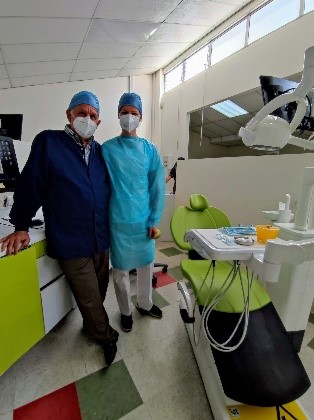
Updated on February 8, 2022
- Dissemination activities of project results
14.05.2022. – lecture at the meeting of the Latvian Dental Association Minimally invasive dentistry – sustainable caries treatment techniques for children and adults.
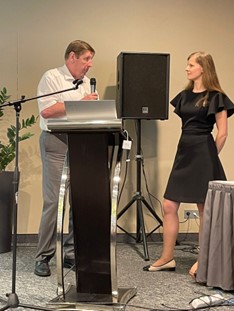
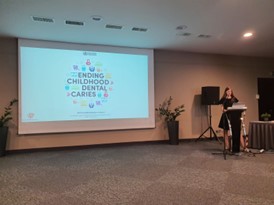
16.05.2022. – at the meeting of the Department of Conservative Dentistry and Oral Health of Riga Stradiņš University presented the first preliminary results of the clinical trial.
19.05.2022. – lecture Noninvasive and minimal invasive caries management for dental hygiene students from Latvia, Finlandia and Belgium as part of the Erasmus+ Intensive Course.
11.06.2022. – all day course for dentists and dental hygienists Noninvasive and minimally invasive caries treatment methods in dental hygienists’ practice.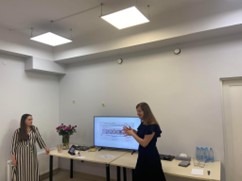
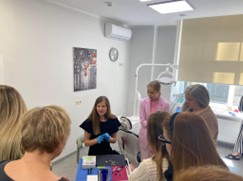
Updated: 29.06.2022.
- The clinical research phase has been completed
The clinical study was performed in children in several groups to evaluate the efficacy and possible side effects of non-invasive methods such as the application of silver diamine fluoride (SDF).
A total of 427 patients were included in the study, 373 patients were re-examined after a 12-month follow-up period (87%; we expected at least 70%). The main reasons for patients not attending for the follow-up were related to change of residence due to the COVID pandemic or traditional dental treatment during the follow-up period. Only 5 families withdrew from participation because they were not satisfied with the treatment methods offered by the trial.
Data cleaning, digitalisation and data analysis have been completed. Ilze Maldupa is currently still working on data visualisation, final report and publications.
Updated: 29.06.2022.
- Participation in EAPD Congress
16.06.2022. – together with third-year paediatric dentistry resident Dr. Jeļena Grišakova, we presented the results of the study Early childhood caries risk indicators in Latvia: a case-control study at the 16th Congress of the European Academy of Paediatric Dentistry. The main findings were that if parents brush their children's teeth every night with toothpaste containing at least 1000 ppm fluoride, the risk of caries is reduced by about ten times, even with frequent consumption of sweets. And interestingly, in families where children already have a caries history, there is a tendency to reduce eating sweets and drinking sugary drinks.
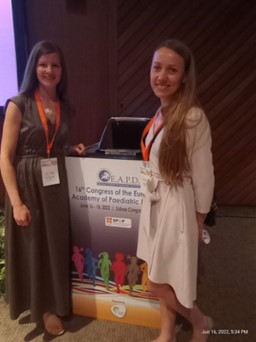
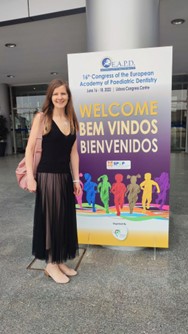
Updated: 29.06.2022.
- Participation in EAPDH Congress
The 26th EADPH Congress was hold from 8 to 10 September 2022 in Montpellier, in the South of France. The theme was Non-communicable diseases: time for action. EADPH is proposing a pro-active conference with the aim of associating general theoretical knowledge with tangible outcomes.
On September 9th Ilze Maldupa presented project results Parents' satisfaction with aesthetic results of non-invasive Severe-Early Childhood Caries treatments for which she received the Travel Award.
After the conference, the abstracts were published in Community Dental Health.
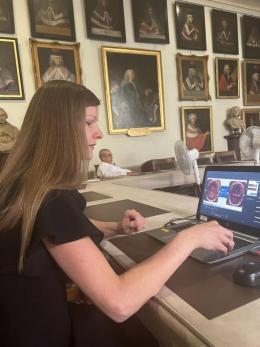
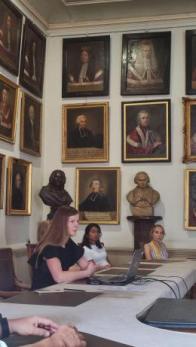
Updated 30.09.2022.
- Participation in program “Revidents”
Ilze Maldupa took part in the TV program Revidents in Latvian national television on the effects of sweets on children's teeth.
A recording of the program is available here.
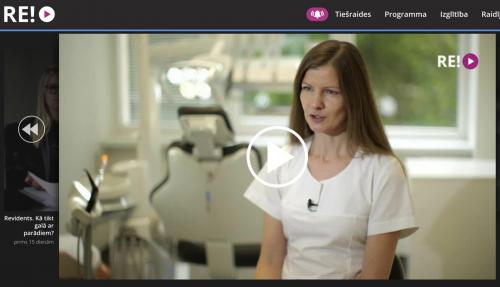
Updated 25.10.2022.
- Mobility at Cardiff University, UK
From 30 September 2022, Ilze Maldupa is visiting Cardiff University in Wales, UK. The first month has now passed, during which she has completed the various formalities to be able to participate in the University's research groups and observe clinical work as a sponsored researcher and associate.
At Cardiff University School of Dentistry she:
- participated in discussions on current publications;
- participated in meetings with mentor and Dean of the Faculty of Dentistry, Prof Nicola Innes;
- listened to Prof Nicola Innes lecture on Minimally Invasive Dentistry;
- participated in the caries assessment calibration process (5-year-olds),
- participated in Prof Nicola Innes science group meetings, webinar Is It Worth It? Applying Health Economics in Oral Health,
- participated in Cardiff University Paediatric Dentistry Study Club meetings,
- took part in Cardiff University Staff Day – gave talks on caries treatment, dental hygiene and dental therapy education, developing a learning centred online platform, inclusive curriculum, North Wales Dental Academy, Immersify app, improving feedback in education and
- participated in the Educational Research Working Group.
She has had the opportunity to visit and observe clinical work in the paediatric dental unit, consult with orthodontists, paediatric dentists, cariology specialists and colleagues in restorative dentistry on different approaches to caries treatment in dentistry.
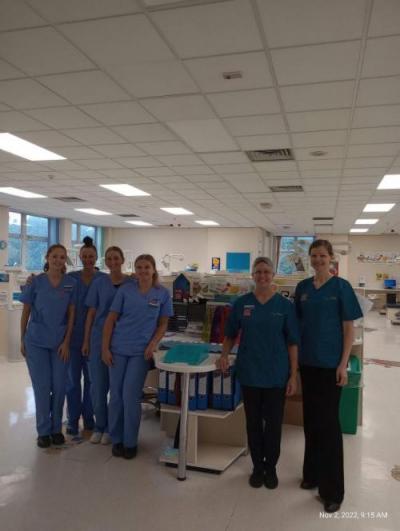
Cardiff University School of Dentistry Paediatric Dentistry Clinic; with mentor Prof Nicola Innes, Dean of the Faculty of Dentistry, and Dental Therapy students.
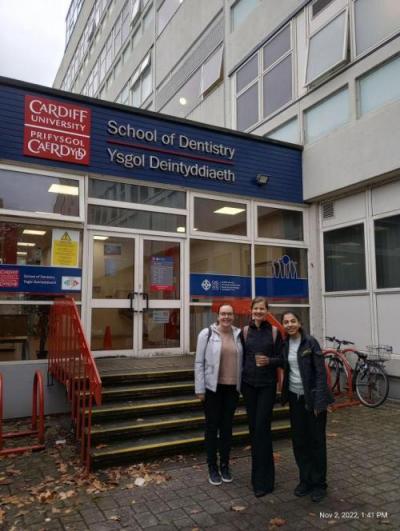
At the entrance of Cardiff University School of Dentistry with colleagues Dr. Waraf Al-Yaseen and Dr. Kathryn Rowles.
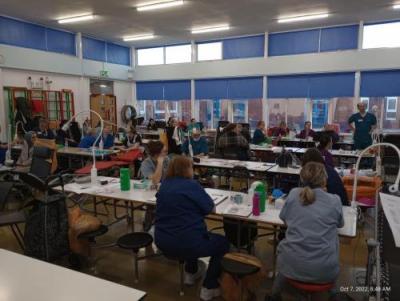
Calibration activity of Welsh dentists for an epidemiological study of caries prevalence in 5-year-olds on 7 October 2022.
Updated on 30.10.2022.
- Continued and completed mobility at Cardiff University in the UK
The last four months of the project were spent at the Cardiff University Dental School, gaining experience from the Dean of the Faculty, an expert in paediatric dentistry Prof. Nicola Innes and her research team.
During the visit was established a close collaboration with Assoc. Prof. Daniela Raggio and lect. Waraf Al-Yaseen, with whom had already started working on a scoping review recommendations for treating caries complications in primary teeth.
During the mobility, Ilze Maldupa participated in the regular meetings of the Improving Dentistry research group and the Department of Paediatric Dentistry, as well as in several scientific and social events, giving presentations on the research topic, paediatric dentistry and the history and present of Latvian dentistry. Ilze Maldupa also had the opportunity to participate in clinical work in the Department of Paediatric Dentistry, where she could observe how minimally invasive paediatric dentistry is applied in practice, what information is given to parents and children, how children's behaviour is modified and how the outcome of treatment is evaluated.
On 25 November, Ilze Maldupa attended the Improving Dentistry research group away day, where we discussed the clinical trials being carried out within the group; heard about experiences and technical advice on the process of obtaining ethics committee approval, and discussed future research lines.
There were regular journal clubs, each discussing a relevant scientific publication, critically appraising quality and impact, and study clubs for paediatric dental professionals, each dedicated to a specific topic with presentations and discussions. For one of them, Ilze Maldupa prepared a lecture entitled What every dental professional should know about breastfeeding? which challenged myths in the profession about the impact of breastfeeding on teeth.
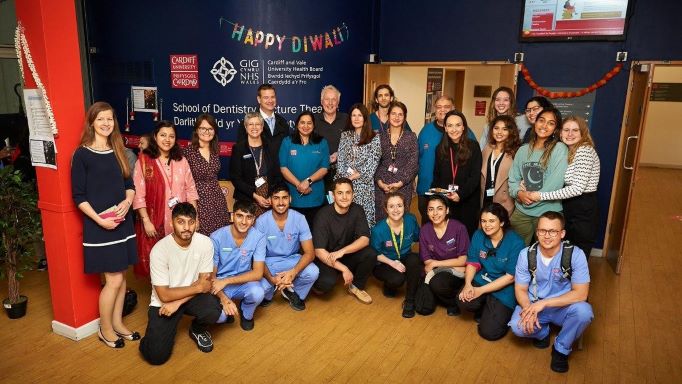
Diwali – Festival of Light, celebrated in India and at Cardiff University – a way to combine scientific and academic work at the university cultural events.
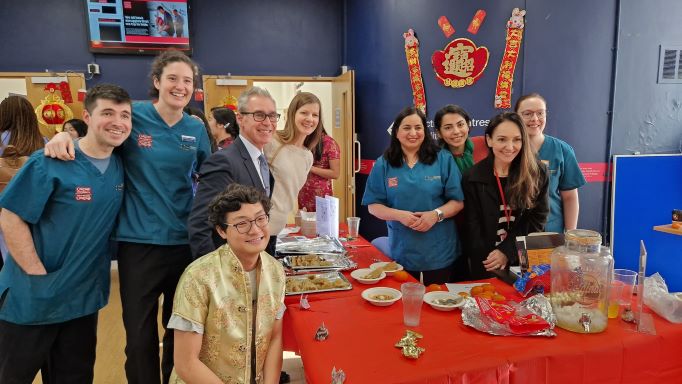
Chinese New Year - tasting the gastronomical delights of China with scientific discussions.
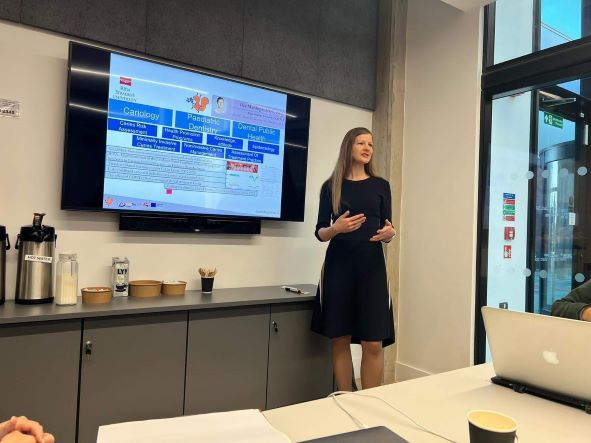
"Improving Dentistry" Research Group Away Day on 25 November 2022. Presenting research activities in the field, listening to the stories of other experiences and discussing future lines of research.
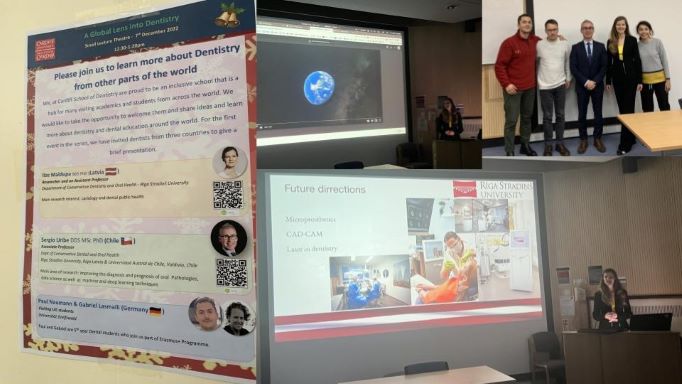
"A Global Lens on Dentistry" – a session on the experiences of different countries in developments in dentistry, both educational and scientific.
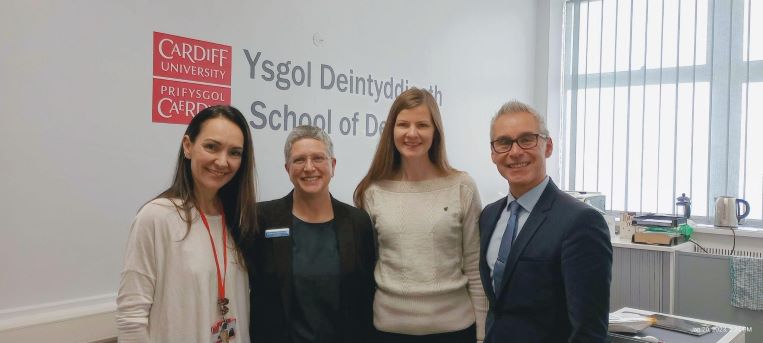
With Assoc. Prof. Daniela Raggio (University of São Paulo, Cardiff University), Prof. Nicola Innes (Dean, School of Dentistry, Cardiff University) and Assoc. Prof. Sergio Uribe (Riga Stradiņš University).
Updated on January 31, 2023
- The end of the project and achieved results
The implementation of the project ended on 28th February 2023. On February 24, a meeting of the project council was held, where the results were presented and future research activities were outlined The project has revealed important insights into the effectiveness of silver diamine fluoride in preventing caries complications in preschool children, as well as the significance of reapplying the varnish at six-month intervals. The study has also highlighted the key risk factors for caries, demonstrating that a child's risk of caries can increase up to ten times if parents fail to brush their child's teeth every night with a fluoride toothpaste containing at least 1000 ppm fluoride. Visible plaque on the child's teeth is also a significant factor, but the risk can be reduced if sugary drinks and foods are consumed only 1-2 times per week.
Furthermore, the project has found that parents are willing to use silver diamine fluoride to treat decay, even with negative aesthetic effects. The clinical study revealed that the type of application (silver diamine fluoride or a non-staining varnish) did not affect parental satisfaction with the aesthetic outcome of treatment. An overwhelming 96% of parents chose to continue using these methods to control their child's caries.
With the project concluded, the new knowledge gained needs to be translated into clinical practice. The FLPP IEVA team will now take charge of this translation over the next three years.
The data were published and codebook and the script of the data analysis is available here:
- Maldupa, Ilze; Uribe, Sergio, 2023, Trends in dental treatment under general anaesthesia for children in Latvia 2005–2020 – Dataset, https://doi.org/10.48510/FK2/LUUOMS, Dataverse, V1, UNF:6:121N6snJeCwaeC5iGrLj7w== [fileUNF]
- Uribe SE, Maldupa I. Dataset Treatment of early childhood caries with three different topical fluoride treatments: a randomised clinical trial. Epub ahead of print 25 February 2023. DOI: 10.17605/OSF.IO/C423T.
During the final stage of the project, a publication has been submitted to the International Journal of Paediatric Dentistry Clinical effectiveness/ patient satisfaction of two topical fluoride treatments for children with caries: a randomised clinical trial.
Minimally invasive caries control methods in dental hygienists' practice – seminar and practical training for dental hygienists of the private clinic Kronis in Jelgava on 18 February 2022.
Recommendations for decision-making organisations Recommendations for treatment of dental caries with non-invasive methods have been developed and sent to the boards of the Latvian Dental Association and the Latvian Dental Hygienists Association, as well as to the Chief Dental Specialist of the Centre for Disease Prevention and Control, Dr Andis Paeglitis.
https://www.bernuzobi.lv/profesion%C4%81%C4%BCiem
Updated on February 28, 2023




